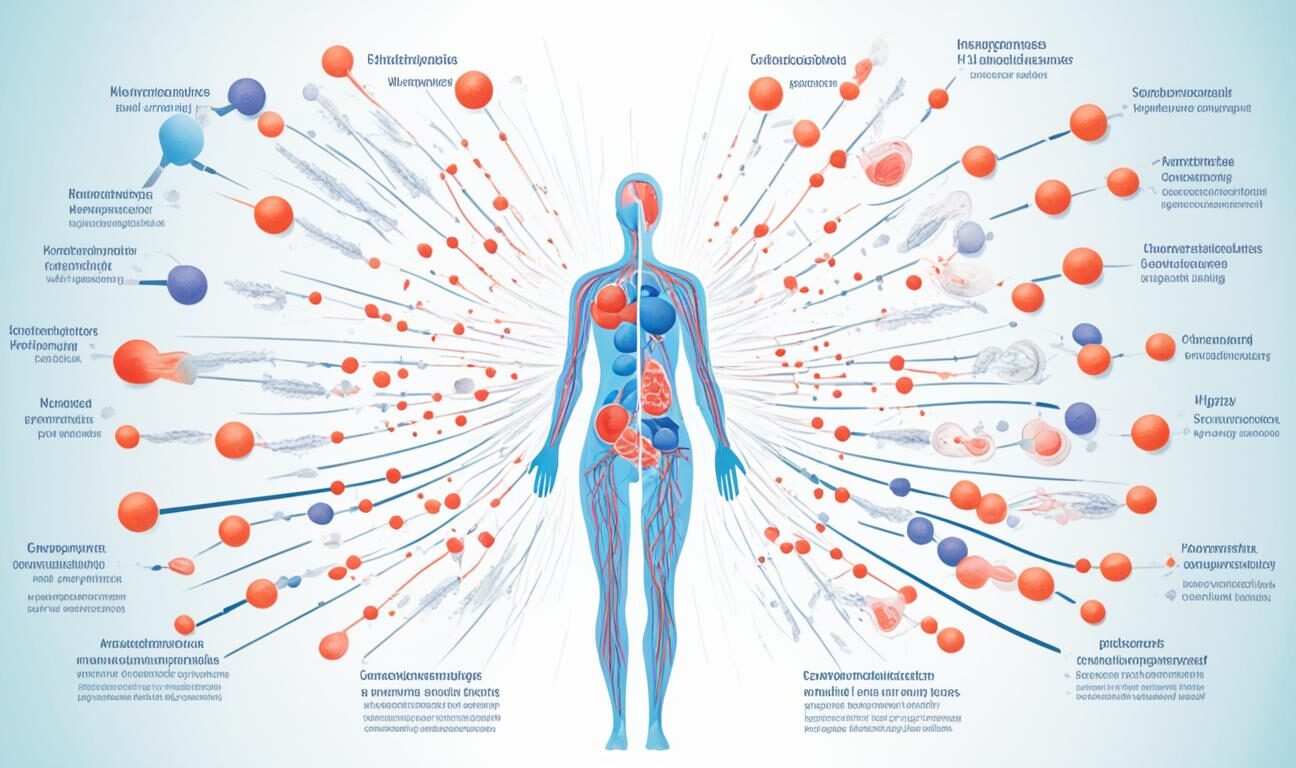Miscarriage is a tough loss for many expecting parents. I know the pain of losing a pregnancy before 20 weeks. It brings deep emotional pain and grief. But, by understanding miscarriage causes and prevention, we can help protect our pregnancies.
This guide will cover the main causes of miscarriage, like chromosomal issues and lifestyle choices. It also offers tips to lower the risk of losing a pregnancy. If you’re trying to conceive or have had a miscarriage before, this info can help you make better choices. It can also boost your chances of a healthy pregnancy.

Key Takeaways
- Understand the common causes of miscarriage, including chromosomal abnormalities, uterine issues, and autoimmune disorders.
- Learn about the impact of lifestyle factors, such as smoking, alcohol consumption, and stress, on pregnancy outcomes.
- Discover the importance of age and its connection to the risk of miscarriage.
- Explore the management of recurrent miscarriages and the role of medical guidance.
- Gain insights into the different types of miscarriage, their causes, and effective prevention strategies.
Understanding the Heartbreak of Miscarriage
Going through a miscarriage is tough and emotional. It’s a loss that can come out of nowhere, leaving people feeling lost with lots of feelings. These feelings include grief, guilt, and despair. The emotional impact of miscarriage is huge, as dreams of a new life are broken.
Coping with Emotional Turmoil
Everyone deals with pregnancy loss differently. It’s key to let yourself feel and work through the complex emotions. You might feel angry, sad, anxious, or like you’ve failed. Remember, these feelings are normal and part of grieving. There’s no one “right” way to get through it.
Seeking Support and Solace
It’s important to find miscarriage support resources and people who understand during this hard time. This could mean talking to healthcare providers, joining support groups, or leaning on friends and family. Sharing your feelings with others and finding a safe space to talk can really help you heal.
You’re not alone in this tough time. With the right support, you can get through the heartbreak of miscarriage and start healing.

“The journey through miscarriage is not an easy one, but with compassion and care, we can find the strength to move forward.”
Exploring the Causes of Miscarriage
Having a miscarriage can be very hard for many women. It’s important to know the main reasons why it happens. This helps us understand and deal with this tough issue.
Chromosomal abnormalities are a big reason for miscarriage. These genetic issues can happen early in pregnancy. They make it hard for the embryo to grow. Things like being older, toxins in the environment, and some health conditions can raise the risk of these problems.
Uterine abnormalities also play a part. Issues like fibroids or polyps in the uterus can make it hard for the baby to grow. This often leads to losing the pregnancy.
Our choices can affect miscarriage too. Smoking, drinking alcohol, and high stress can up the risk. But, making healthy choices like eating well, staying active, and managing stress can help lower these risks.
Autoimmune disorders can also cause miscarriage. This happens when the body attacks the growing baby. Conditions like lupus or thyroid problems are linked to a higher risk of losing a pregnancy.
We’ll look more into these causes of miscarriage next. We’ll give insights and advice on how to handle this tough time. We’ll also talk about how to lower the risk of losing a pregnancy.
Chromosomal Abnormalities: A Leading Factor
Chromosomal abnormalities are a top reason for miscarriage. These genetic issues can affect a pregnancy’s development and make it not viable. Knowing about chromosomal problems helps us understand why some pregnancies end early.
Genetic Testing for Insight
Genetic tests are key in finding chromosomal problems linked to miscarriage. They look at the embryo or fetus’s genes. This way, doctors can learn important info for planning future pregnancies. Chromosomal abnormalities, like extra or missing chromosomes, are often found through these tests.
- Trisomies, with an extra chromosome, often cause miscarriage, especially early on.
- Monosomies, missing a chromosome, can also lead to pregnancy loss.
- Structural chromosomal issues, like translocations or inversions, can stop the fetus from developing right and cause miscarriage.
Tests for chromosomal abnormalities and genetic factors give us important insights. They help doctors and patients make smart choices about planning families and managing pregnancies. This info is key in dealing with the tough feelings and challenges of miscarriage.

“Understanding the underlying causes of miscarriage, including chromosomal abnormalities, is crucial in providing effective support and guidance to those who have experienced this heartbreaking event.”
Uterine Abnormalities and their Impact
Some uterine abnormalities can greatly increase the risk of miscarriage. Issues like fibroids or polyps can make it hard for a woman to carry a pregnancy to term.
Fibroids are noncancerous growths in the uterus. They can stop the fetus from implanting and growing. These growths can also block the fallopian tubes, keeping the fertilized egg from reaching the uterus.
Uterine polyps are small, benign growths that stick out into the uterus. They can make it tough for the embryo to implant and grow well.
| Uterine Abnormality | Impact on Pregnancy |
|---|---|
| Fibroids | Interfere with implantation and fetal growth; block fallopian tubes |
| Uterine Polyps | Disrupt normal uterine function, making implantation difficult |
Many of these uterine problems can be treated with surgery or hormone therapy. This can help improve the chances of a successful pregnancy for women with these conditions.

“Understanding the impact of uterine abnormalities on pregnancy is crucial for women who have experienced or are at risk of miscarriage.”
Autoimmune Disorders and Miscarriage Risk
Autoimmune disorders and blood clotting issues can greatly increase the risk of miscarriage. These conditions can mess with the immune system’s ability to support a healthy pregnancy. This can lead to pregnancy loss.
Managing Underlying Conditions
If you have an autoimmune disorder like lupus or antiphospholipid syndrome, it’s key to work closely with your healthcare provider. They can help you manage your condition before and during pregnancy. This might mean taking certain medications, keeping an eye on your immune system, and making changes to your lifestyle to help your pregnancy stay healthy.
- Talk to your healthcare provider about your autoimmune disorder and make a plan for pregnancy.
- Add immune-boosting foods and supplements to your diet, if your healthcare provider suggests it.
- Try stress-reducing activities like yoga, meditation, or counseling to help your well-being.
If you have a blood clotting disorder, your healthcare provider might recommend blood-thinning medication or other treatments to lower pregnancy risks.
| Autoimmune Disorder | Potential Impact on Pregnancy | Management Strategies |
|---|---|---|
| Lupus | Increased risk of miscarriage, preterm birth, and other complications | Medication, frequent monitoring, stress management |
| Antiphospholipid Syndrome | Increased risk of blood clots, recurrent miscarriage, and preeclampsia | Blood-thinning medication, close medical supervision |
Working with your healthcare team to manage autoimmune or blood clotting disorders can help support a healthy pregnancy. It can also lower the risk of miscarriage.

Lifestyle Factors: Smoking, Alcohol, and Stress
Our daily choices can greatly affect our health during pregnancy. Smoking, drinking alcohol, and high stress levels can increase the risk of miscarriage. It’s important for pregnant women to know how these factors affect their health.
Smoking is a big risk for pregnancy problems. The chemicals in cigarettes can harm the placenta and the growing fetus. Women who smoke during pregnancy face a higher risk of miscarriage. Quitting smoking is key to a healthy pregnancy.
Drinking alcohol can also raise the risk of miscarriage. It can affect the fetus’s growth and cause complications. The best choice is to avoid alcohol during pregnancy.
High stress can harm a woman’s health and her pregnancy. It can mess with hormones and cause inflammation, which can lead to miscarriage. Doing things like yoga, meditation, or counseling can help manage stress and support a healthy pregnancy.
Being aware of these lifestyle factors and changing them can help women support a healthy pregnancy. Staying away from smoking, alcohol, and stress can make a big difference. It can help ensure a successful pregnancy.

| Lifestyle Factor | Impact on Pregnancy | Recommended Action |
|---|---|---|
| Smoking | Increased risk of miscarriage | Quit smoking as soon as possible |
| Alcohol Consumption | Increased risk of miscarriage | Abstain from alcohol entirely during pregnancy |
| High Stress Levels | Disrupts hormonal balance and increases inflammation, contributing to miscarriage | Practice stress-relieving activities, such as yoga, meditation, or seek counseling |
“Adopting a healthy lifestyle during pregnancy is one of the most important steps a woman can take to support a successful pregnancy and reduce the risk of miscarriage.”
Age and Miscarriage: Understanding the Connection
The age of the expectant mother greatly affects the risk of miscarriage. As women get older, their ability to have children declines. This leads to a higher chance of pregnancy problems, including miscarriage.
Maternal age is key in determining pregnancy success. Studies show that the risk of miscarriage goes up when women are advanced in maternal age, meaning 35 years and older.
| Maternal Age | Miscarriage Risk |
|---|---|
| 20-24 years | 10-15% |
| 25-29 years | 10-15% |
| 30-34 years | 15-20% |
| 35-39 years | 20-35% |
| 40-44 years | 40-50% |
| 45 years and older | 50-75% |
The higher miscarriage risk with older mothers comes from egg quality decline and chromosomal issues. Older women’s eggs often have genetic problems, making pregnancy loss more likely.
It’s important for older women to talk to healthcare professionals. They can learn about the risks and how to help ensure a healthy pregnancy. With the right medical care and lifestyle changes, older women can face the challenges of age-related miscarriage risks and boost their chances of a successful pregnancy.

Recurrent Miscarriages: Causes and Investigations
For some, miscarriage can happen more than once. This is called recurrent miscarriage. It’s hard on the body and heart. Understanding why and getting help is key.
Seeking Medical Guidance
If you’ve had several miscarriages, talk to a doctor who knows about reproductive health. They will look into why it keeps happening. They might find causes such as:
- Chromosomal abnormalities – Genetic issues that cause miscarriages.
- Uterine abnormalities – Problems with the uterus shape that can affect pregnancy.
- Autoimmune disorders – When the immune system attacks the growing baby.
- Lifestyle factors – Smoking, drinking, and stress can raise the risk of miscarriage.
- Age – Women over a certain age are more likely to have miscarriages.
Working with your doctor can help find out why you’re having miscarriages. You can then make a plan to improve your chances of a healthy pregnancy. This might mean medical treatments, changing your lifestyle, or both.
“Understanding the underlying causes of recurrent miscarriages is the first step towards finding a path forward and achieving a healthy pregnancy.”
This journey is tough, but with doctors and loved ones by your side, you can face it. You can work towards a successful and healthy pregnancy.

miscarriage causes, pregnancy loss, miscarriage prevention
Miscarriage is a tough experience for many women during pregnancy. Knowing what causes it helps us find ways to prevent it. We will look at the main reasons for pregnancy loss and how to lower the risk.
Chromosomal issues, problems with the uterus, and autoimmune diseases are top causes of miscarriage. Smoking, drinking too much alcohol, and high stress can also raise the risk. Being older can make women more likely to have a miscarriage.
To fight these issues, we need a wide approach to preventing miscarriage. Genetic tests can spot chromosomal problems early, helping us act fast. Managing health issues like uterus problems and autoimmune diseases can also lower the risk.
Living a healthy life helps too. Eating well, exercising, and managing stress can boost your chances of a healthy pregnancy. Getting help from doctors early in pregnancy is key. It lets them spot and fix any risks early.
| Miscarriage Causes | Pregnancy Loss Factors | Miscarriage Prevention Strategies |
|---|---|---|
|
|
|
Understanding miscarriage and taking steps to prevent it can help women lower the risk. By being proactive, women can increase their chances of a healthy pregnancy.

“Knowledge is power, and understanding the factors that contribute to miscarriage can empower women to make informed decisions and take proactive steps to protect their pregnancy.”
Early Pregnancy Loss: Causes and Management
Early pregnancy loss, also known as miscarriage, is a tough experience for many women. These losses often happen in the first three months of pregnancy. Knowing what causes them can help us understand this tough situation better.
Chromosomal abnormalities are a big reason for early pregnancy loss. These genetic issues can happen early in fetal development. They make it hard for the pregnancy to continue. Women’s age and some health conditions can raise the risk of these abnormalities.
Other causes include uterine abnormalities and autoimmune disorders. Problems with the uterus or certain health conditions can make pregnancy hard. This can lead to early loss.
Handling early pregnancy loss needs care and understanding. It’s important to talk to doctors to find out why it happened. They can help make a plan for what to do next. Emotional support and counseling are also key to help women deal with their feelings.

Dealing with early pregnancy loss is complex. But, there are steps to lower the risk. Living a healthy life, managing health conditions, and getting quick medical help can help. These actions can improve the chances of a better outcome.
You’re not facing this alone. With the right support and advice, you can get through the tough times of early pregnancy loss. There is a way forward.
Late Miscarriages: Risk Factors and Prevention
Late miscarriages happen in the second part of pregnancy. They can be very hard to deal with, especially after feeling hopeful about the pregnancy. Knowing what might increase the risk and how to prevent it is key to a healthy pregnancy.
Monitoring and Intervention
It’s important to keep a close eye on the pregnancy and act quickly if needed. Regular check-ups, ultrasounds, and tests can spot problems early. If risks are found, doctors and the mom-to-be can make a plan to lower these risks and help the pregnancy stay healthy.
Some steps that might be suggested include:
- Medication for things like hormonal issues or autoimmune diseases
- Cerclage (cervical stitch) to stop cervical problems
- Resting more or doing less physical activity to ease stress on the body
- Watching the baby closely and acting fast if there are any issues
Working with doctors and taking steps to address risks can help moms have a successful pregnancy. This way, they can avoid the sadness of a late miscarriage.
| Risk Factor | Potential Causes | Prevention Strategies |
|---|---|---|
| Chromosomal Abnormalities | Genetic factors, advanced maternal age | Genetic testing, preimplantation genetic testing for in vitro fertilization |
| Uterine Abnormalities | Congenital defects, uterine fibroids, placental implantation issues | Surgical correction, careful monitoring of placental development |
| Autoimmune Disorders | Lupus, antiphospholipid syndrome, thyroid dysfunction | Medication management, addressing underlying conditions |
| Lifestyle Factors | Smoking, alcohol consumption, high stress levels | Quitting smoking, limiting alcohol, practicing stress management techniques |
Knowing the risks and taking steps to prevent them can help moms have a successful pregnancy. This way, they can avoid the sadness of a late miscarriage.
Missed Miscarriage: Diagnosis and Next Steps
A missed miscarriage, also known as a silent miscarriage, is a tough experience for many expecting parents. It happens when the pregnancy ends but the body hasn’t yet realized it. Understanding how to diagnose and manage it can help you feel more in control.
Diagnosing a Missed Miscarriage
First, you need an accurate diagnosis. Your doctor might use several tools to confirm the loss:
- Ultrasound examination: This test shows if there’s no heartbeat or growth, meaning a missed miscarriage.
- Blood tests: Checking hormone levels can show if the pregnancy is progressing.
- Physical examination: A pelvic exam can tell your doctor about the pregnancy’s status.
Management Options for a Missed Miscarriage
After confirming a missed miscarriage, you’ll talk about how to move forward. Options include:
- Expectant management: Letting your body naturally pass the pregnancy tissue, which can take weeks.
- Medical management: Using medicine like misoprostol to start the miscarriage process.
- Surgical management: A D&C procedure to remove the pregnancy tissue.
Your choice will depend on your health, the pregnancy stage, and what you prefer. Your doctor will help you decide, making sure you get the care and support you need during this hard time.
“The grief of a missed miscarriage can be profound, but with the right support and understanding, healing is possible.” – Dr. Emily Willingham, Reproductive Health Specialist
Ectopic Pregnancy: A Serious Complication
Ectopic pregnancy is a serious condition that needs quick action. It happens when the fertilized egg grows outside the uterus, often in the fallopian tube. This can be dangerous if not treated right away.
The ectopic pregnancy can be risky for the mother’s health. If the pregnancy grows, the tube might burst, causing severe bleeding. This can be deadly if not treated quickly. So, finding it early and getting the right care is key.
Signs and Symptoms
Look out for these signs of an ectopic pregnancy:
- Abnormal vaginal bleeding or spotting
- Pelvic pain or cramping
- Shoulder pain
- Lightheadedness or dizziness
If you notice any of these, get medical help right away. They can check and treat you properly.
Diagnosis and Treatment
Doctors use tests like blood work and ultrasound to spot an ectopic pregnancy. After finding it, they’ll plan the best treatment for you.
Here are some ways to treat it:
- Medication (like methotrexate) to stop the pregnancy from growing
- Surgery to remove the pregnancy and maybe fix the tube
- Watching closely and following up to make sure everything heals right
Quick and right treatment is vital. It helps avoid serious problems and keeps your reproductive health safe.
If you’re worried or have symptoms, get medical help fast. Catching it early and treating it right can make a big difference for your health.
Conclusion
Understanding miscarriage causes and prevention is key in the journey of parenthood. Working with healthcare providers and making smart lifestyle choices helps protect your pregnancy. This approach can increase the chances of a healthy pregnancy and a successful outcome.
Managing chromosomal issues, uterine problems, and the effects of autoimmune disorders and lifestyle is crucial. By staying informed and working with doctors, you can handle the challenges of miscarriage. This leads to a fulfilling pregnancy experience.
Your health and your family’s future are the most important things. With the right knowledge and support, you can make smart choices. This reduces risks and brings joy with the arrival of your baby.







Leave feedback about this